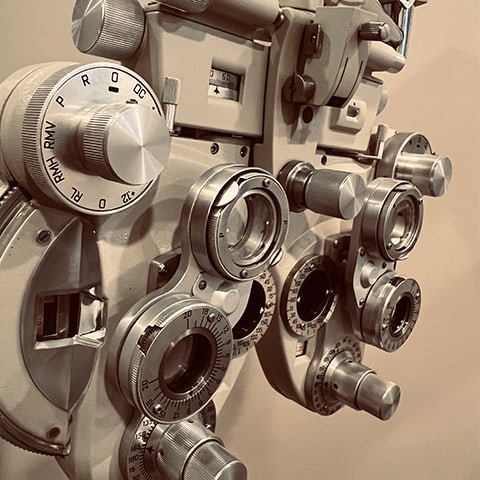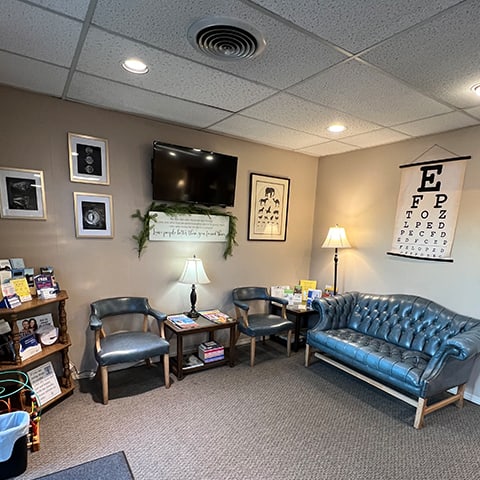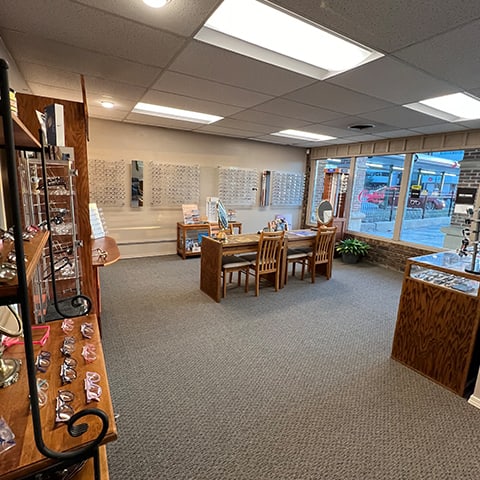Comprehensive, Preventive Care
Eye exams are an important part of preventive health care. We provide a thorough checkup for not only the state of your vision, but also the health and comfort of your eyes. Visual acuity is important, but assessing the health of the internal and external structures of your eyes is imperative as well.
Regular exams allow our optometrists to look for early signs of eye disease. Many conditions that lead to vision loss do not show symptoms at first, so seeing an optometrist is essential for detecting and preventing eye diseases.
Our thorough approach establishes a baseline for your vision and your ocular health, allowing us to monitor your eyes over time and check for changes that may indicate the development of eye diseases. We’ll always explain any recommended procedures or tests we provide.
Request Appointment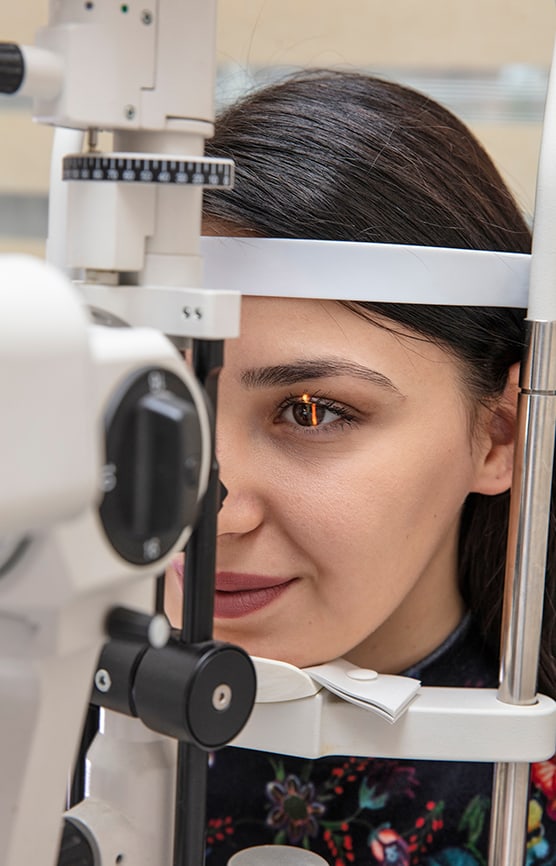
The When & Why of Eye Exams
The American Optometric Association recommends low-risk adult patients have an eye exam every 2 years until age 65, when they should have annual eye exams.
Patients who wear contacts, have a very high prescription, have a vision condition, or live with other health conditions like diabetes may need more frequent exams as recommended by their optometrist. We will work with you to determine a personalized schedule.
Request AppointmentWhat Happens During an Eye Exam?
When you walk into our practice, you’ll be greeted by our friendly team. If you’re a new patient, we’ll ask questions about your health history, lifestyle, and current medications and answer any questions you have.
During your exam, we will thoroughly evaluate both the internal and external structures of your eyes using proven technology. We will measure your visual acuity to determine whether you need corrective lenses, and if you already have them, we’ll check that your prescription is up to date.
We may also assess your color vision, how well the eyes work as a team, depth perception, and the way your pupils respond to light. We use a hand-held ophthalmoscope, and a microscope called a slit lamp to examine your eyes.
With high-resolution fundus photography and ocular coherence tomography, we can capture images of the eye’s most important structures.
Images of your retina, macula, and optic nerve can give us an up-close look at the blood vessels and other internal structures in these areas, allowing us to observe any anomalies. Keeping the images on file lets us look for any changes between appointments, allowing us to detect and manage eye diseases like glaucoma or age-related macular degeneration.
Book Your Appointment Today
Even if you think you have perfect vision, it’s still important to have regular eye exams. Eye diseases can begin without easily noticeable symptoms, so comprehensive eye exams remain essential for assessing and detecting any early signs of sight-threatening conditions.
Prioritize your sight by booking a comprehensive eye exam today.
Request AppointmentCome Visit Us
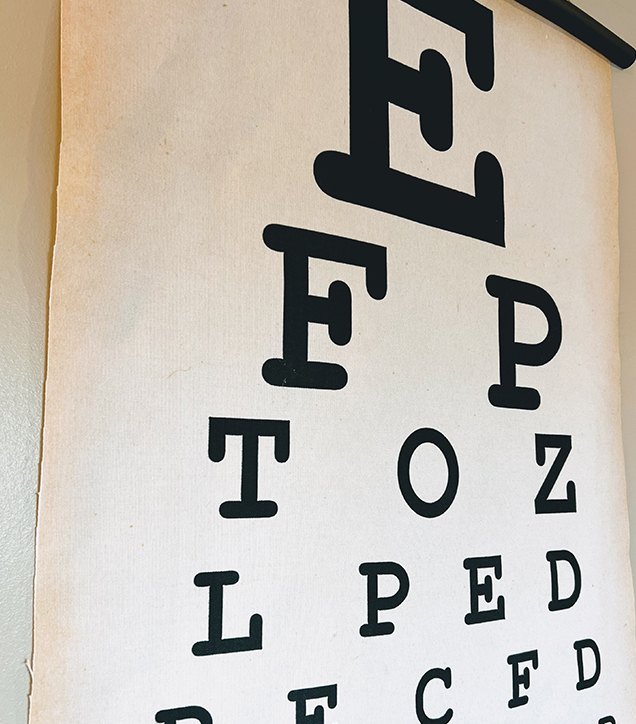
Our Address
- 5910 S Lewis
- Tulsa, OK 74105
Contact Information
- Phone: 918-745-9700
- Fax: 918-743-8102
- Email: staff@adudleyod.com
Hours of Operation
- Monday: 8:30 AM – 5:30 PM
- Tuesday: 8:30 AM – 6:00 PM
- Wednesday: 8:30 AM – 5:30 PM
- Thursday: 8:30 AM – 5:30 PM
- Friday: 8:30 AM – 2:00 PM
- Saturday: Closed
- Sunday: Closed
Insurance & Payment Information
Dr. Dudley’s Primary Eye Care believes in providing the best value for you and your family. We have products and pricing that aims to accommodate all budgets and our office participates in most insurance programs. For patients who have little or no vision insurance coverage, flexible payment programs may be arranged. To learn more about our payment options, please call our office directly.
Vision Insurance
We accept several forms of vision insurance including:
- EyeMed
- Superior Vision
- Primary Vision Care Services (PVCS)
- Vision Care Direct
- Humana Vision
- Vision Service Plan (VSP)
- Care Credit
- And More
We are also provider for Medicare, several Blue Cross Blue Shield plans, BlueLincs HMO and United Health Care
*Please call our office with any insurance inquiries!
Flexible Spending & Savings Plans
- Flexible Spending Plans
- Health Savings Accounts (HSA)
- Medical Savings Accounts (MSA)
- Cafeteria Plans
All of the above plans can be used for all your eye care and eyewear needs, including eyeglasses, contact lenses, routine office visits and medical office visits.
Care Credit
The Care Credit card is available to help people pay for health care expenses, often with an introductory period that is interest-free. We accept Care Credit for all of our services. To learn more or apply, visit Care Credit here.
Our Services
Our Brands








Our Google Reviews
Our Blogs
Eye Exams: What to Expect
Eye Health and DiseasesYearly comprehensive eye exams are crucial to detecting changes in your vision and risk of eye-related diseases. We recommend adults have a comprehensive eye exam every year, and children should have an eye exam as early as six months before they start school, and then every 1-2 years. We often get questions about what to […]
Bifocal vs Progressive Lenses
Eye Health and DiseasesFor individuals that need vision correction both near and far, progressive or bifocal lenses are a must-have! As your eyes age and your vision changes, age-related farsightedness or presbyopia may start to affect your vision. What are Bifocal or Progressive Lenses? Progressive and bifocal lenses transition from near to far distance prescription within one lens! […]
6 Common Eye Symptoms and What to Do
Eye Health and DiseasesSuffering from eye discomfort or blurry vision can be scary, especially if it comes on suddenly or is a result of a dramatic event. Below are some of the common eye-related disorders. However, remember that common doesn’t mean it should be ignored. If you are experiencing any of these systems or if you have questions […]
Eye Exams: What to Expect

Yearly comprehensive eye exams are crucial to detecting changes in your vision and risk of eye-related diseases. We recommend adults have a comprehensive eye exam every year, and children should have an eye exam as early as six months before they start school, and then every 1-2 years. We often get questions about what to […]
Bifocal vs Progressive Lenses

For individuals that need vision correction both near and far, progressive or bifocal lenses are a must-have! As your eyes age and your vision changes, age-related farsightedness or presbyopia may start to affect your vision. What are Bifocal or Progressive Lenses? Progressive and bifocal lenses transition from near to far distance prescription within one lens! […]
6 Common Eye Symptoms and What to Do

Suffering from eye discomfort or blurry vision can be scary, especially if it comes on suddenly or is a result of a dramatic event. Below are some of the common eye-related disorders. However, remember that common doesn’t mean it should be ignored. If you are experiencing any of these systems or if you have questions […]






